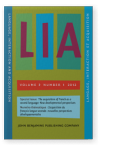Formulaic and proceduralised language in the initial and advanced stages of learning French
This article is based on the model of SLA presented in Approaches to Second Language Acquisition (Towell & Hawkins 1994). It begins by presenting that view in summarised form. It then looks at four sets of empirical data drawn from two longitudinal multiple case studies and interprets the evidence in the light of the particular approach. The first two deal with learners in the initial stages of learning and show how they have to store formulaic knowledge in order to be able to extract syntactic information. The second two deal with advanced learners and show how they have to chunk and proceduralise intermediate knowledge in order to be able to develop both their knowledge and their fluency. The study of the advanced learners shows, however, that they do not become either as knowledgeable or as fluent in the L2 as they are in the L1. An interpretation of that evidence within the model offered suggests that this is because their L2 is based on a multiplicity of knowledge sources and that processing this kind of knowledge is more demanding of the memory systems than acquiring knowledge of and the ability to process the L1.
Cited by (1)
Cited by one other publication
García-Amaya, Lorenzo
2024.
Investigating the relation between L2 pauses, syntactic complexity, and pause location: Longitudinal data from L2-Spanish study-abroad learners.
Second Language Research 40:2
► pp. 399 ff.

This list is based on CrossRef data as of 11 august 2024. Please note that it may not be complete. Sources presented here have been supplied by the respective publishers.
Any errors therein should be reported to them.
